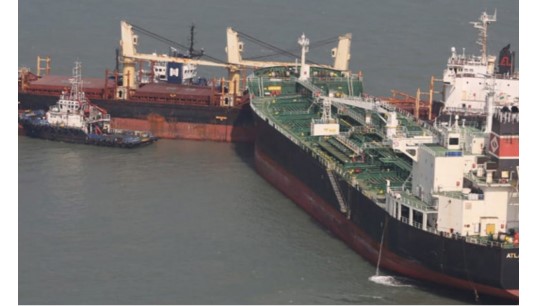- Topics
- Campaigning
- Careers
- Colleges
- Community
- Education and training
- Environment
- Equality
- Federation
- General secretary message
- Government
- Health and safety
- History
- Industrial
- International
- Law
- Members at work
- Nautilus news
- Nautilus partnerships
- Netherlands
- Open days
- Opinion
- Organising
- Podcasts from Nautilus
- Sponsored content
- Switzerland
- Technology
- Ukraine
- United Kingdom
- Welfare

‘Ineffective’ navigation and failure to properly supervise watchkeeping officers has been blamed for a collision off the coast of India
Accident investigators have found that the crews of the 18,957dwt bulker Aviator and the 49,999dwt tanker Atlantic Grace failed to use all available means to assess the risk of collision and to take positive action to avoid it.
The two ships – both in ballast at the time – collided in the Gulf of Kachchh, off the NW coast of India, in November 2021 even though one vessel had first spotted the other 8nm away and 20 minutes before the collision.
Although no one was injured, it took more than a week for salvage teams to separate the two ships and the bulker was later declared a total loss.
Investigators said both bridge teams were aware of the relative position of the other ship for at least a quarter of an hour before the accident but neither had used equipment such as ARPAs to determine the risk of collision. The two ships had approached each other at a combined speed of 24 knots, with avoiding action being taken only one minute before the collision.
A report published by the Marshall Islands maritime administrator notes that both ships were operating in autopilot until a few minutes before the collision, even though Aviator’s standing orders required hand steering when within 3nm of another ship and Atlantic Grace’s safety management system required hand steering within 25nm of land.
It says the masters of both ships had failed to properly supervise their watchkeeping officers, spending most of the time leading up to the collision doing chartwork behind the bridge curtains. The bulk carrier’s OOW was on his first contract as a junior officer and the tanker’s OOW had only two years’ experience as a third officer and was on his first trip on an Anglo Eastern ship.
Investigators said the Hong Kong-flagged tanker’s bridge team appeared to have been aware of a VHF message from the Gulf of Kachchh vessel traffic services, 13 minutes before the accident, warning of the risk of collision.
The bulker’s crew failed to hear it at all because they were monitoring a different VHF channel.
Neither vessel had used sound signals as they approached each other, as prescribed in the collision prevention regulations.
The tanker’s OOW said he had passed a planned waypoint where he was meant to turn because he wanted to avoid fishing nets that had been spotted off the ship’s side and the report said he had appeared to prioritise this over assessing the risk of collision.
The investigation report recommends that the managers of both ships ‘use the lessons learned from this very serious marine casualty’ as the basis for reviewing with masters ‘their expectations for providing oversight of and guidance for junior deck officers’.
Tags
